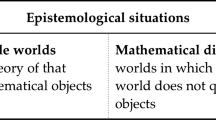Abstract
It is claimed that the indispensability argument for the existence of mathematical entities (IA) works in a way that allows a proponent of mathematical realism to remain agnostic with regard to how we establish that mathematical entities exist. This is supposed to be possible by virtue of the appeal to confirmational holism that enters into the formulation of IA. Holism about confirmation is supposed to be motivated in analogy with holism about falsification. I present an account of how holism about falsification is supposed to be motivated. I argue that the argument for holism about falsification is in tension with how we think about confirmation and with two principles suggested by Quine for construing a plausible variety of holism. Finally, I show that one of Quine’s principles does not allow a proponent of mathematical realism to remain agnostic with regard to how we establish that mathematical entities exist.
Similar content being viewed by others
Notes
A version of this kind of argument that has received extensive attention is the so-called ‘Putnam-Quine indispensability argument’. Even though this argument was never explicitly stated by either Putnam nor Quine (Liggins 2008), the premises cited for the argument can be found in various places in the writings of Quine.
Maddy (1992) suggests that naturalism is in tension with confirmational holism because scientists in their actual practice of science do not take evidence in favour of their theories to be evidence in favour of all of their theories. Sober (1993) has argued that the confirmational relation is a three-part relation between evidence, theory and background theory, and since the same mathematics is (most often) employed in competing theories, it should be considered irrelevant to confirmation.
It is difficult to find a proper motivation behind confirmational holism in Quine’s writings. Colyvan (2001) mistakingly believes that confirmational holism can be argued to follow from semantic holism, even though he wants to distance himself from that approach due to semantic holism being a contentious view. In fact, the direction is the other way around. As argued by Okasha (2000), given a verificationist starting point where semantic relations are identified with relations of evidential support, the meaning of a statement would be determined by whatever experience would confirm it. If however, confirmation is holistic, meaning would appear to be holistic too. Okasha takes this argument to be expressed by Quine in Quine (1986), (1974, 38) and (1969, 80f).
One point to notice and then set aside is that, according to Quine, any purely logical truths will not be considered, because logical truths do not add anything to the implication we are considering. Also, if we were to blame our logical truths, the falsifying evidence would no longer count as being falsifying evidence as the logics required for making the derivation would no longer imply it. This point is also made by Resnik (2005).
The idea that mathematics contributes to the good-making qualities of scientific theories is suggested in the context of evaluating theories that are formulated using some portion of mathematics. The claim is not that for any scientific theory, adding mathematics will make that theory better. See Busch (forthcoming) for further discussion of the relationship between Colyvan’s suggested formulation of IA and the version that relies on confirmational holism.
References
Busch, J. (Forthcoming). Is the indispensability argument dispensable?’ Theoria.
Colyvan, M. (2001). The indispensability of mathematics. New York: Oxford University Press.
Colyvan, M. (2006). Scientific realism and mathematical nominalism: A marriage made in Hell. In C. Cheyne & J. Worrall (Eds.), Rationality and reality: Conversations with Alan Musgrave (pp. 225–237). Australasian Studies Series: Kluwer.
Duhem, P. M. M. (1906). The aim and structure of physical theory. Princeton: Princeton University Press.
Folina, J. (1999). ‘Book review: Michael Resnik. Mathematics as a science of patterns. Notre dame journal of formal logic, 40(3), 455–472.
Liggins, D. (2008). Quine, Putnam and the ‘Quine-Putnam’ indispensability argument. Erkenntnis, 68, 113–127.
Maddy, P. (1992). Indispensability and practice. The Journal of Philosophy, 89, 275–289.
Melia, J. (2000). Weasling away the indispensability argument. Mind, 109, 455–479.
Morrison, J. (2010). Just how controversial is evidential Holism? Synthese, 173(3).
Okasha, S. (2000). Holism about meaning and about evidence: In defence of W.V Quine. Erkenntnis, 52, 39–61.
Quine, W. V. (1953). On mental entities. Proceedings of the American Academy of Arts and Sciences, 80(3), 198–203.
Quine, W. V. (1969). Epistemology naturalized, in his ontological relativity and other essays. New York: Columbia University press.
Quine, W. V. (1974). The roots of reference, Open Court, la Salle.
Quine, W. V. (1981). Theories and things. Cambridge MA: Harvard University Press.
Quine, W. V. (1986). Reply to Roger F. Gibson Jr. In L. E. Han & P.A. Schlipp (Eds.), The philosophy of W. V Quine, Open Court, la Salle, Illinois.
Quine, W. V. (1992). Pursuit of truth. Cambridge MA: Harvard university Press.
Resnik, M. (1997). Mathematics as a science of patterns. Oxford: Clarendon Press.
Resnik, M. D. (2005). Quine and the web of belief, In S. Shapiro (Ed.), Oxford Handbook of Philosophy of Mathematics and Logic. Oxford: Oxford University Press.
Sober, E. (1993). Mathematics and indispensability. Philosophical review (Vol. 102, pp. 35–58).
Acknowledgments
I wish to thank Peter Clark for helpful discussion on Quine and holism, and an anonymous referee for this journal for helpful comments on an earlier version of this article. I would also like to express my gratitude towards Prof. Helmut Pulte for his generosity, and his helpful suggestions for how to shorten the original manuscript.
Author information
Authors and Affiliations
Corresponding author
Rights and permissions
About this article
Cite this article
Busch, J. Indispensability and Holism. J Gen Philos Sci 42, 47–59 (2011). https://doi.org/10.1007/s10838-011-9142-4
Published:
Issue Date:
DOI: https://doi.org/10.1007/s10838-011-9142-4



